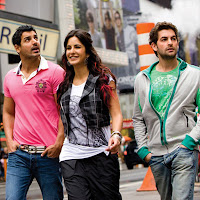
Oh, how badly I wish I could have live-blogged the experience of watching New York, Kabir Khan's well-meaning but ill-conceived film about South Asians in the United States after 9/11. Here is a movie that changes gears so often, and sometimes so clumsily, it would have been easier to blog about it every ten minutes than it is to write a full review in retrospect. I hear it's a hit, and I like the fact that New York, hatched in the plush offices of Yash-Raj, searches for something approaching meaningful menace in Manhattan. But it's still an uneasy mess of a film, and ultimately doomed by the same orchestral fanfare and sweeping autumn leaves as all the Johars before it.
In an utterly compromised first half, Khan seems out of his depth. There's a hoary love-triangele plot in the offing, but its shabby and unconvincing, which only makes the orgiastic, musically-announced happiness of it all quite miserable. Abraham, Kaif and Mukesh don't have very much to do here, and they do that pretty well, I guess. That's the first half. Tedious.
By contrast, the last ninety minutes have a lot of plot and punch, and would have made for a better movie by themselves. Repairing the damage done by Irrfan-I-Need-A-Makeover-Khan, playing a - you guessed it - cop, there is a beguilingly tortured performance from an actor whose name I don't even know, playing a Muslim who was detained by the FBI for weeks and weeks after 9/11. He only has two or three scenes, but I'm counting the small mercies. Similarly, while I find it hard to believe that the FBI would ever handle any undercover operation the way they do this one, I was solemnly struck by the Guantanamo Bay/ Abu Ghraib evocativeness of the film's middle passages. There is also a satisfyingly bloody climax, but a perfunctory final scene that looks like it crept back into the film from the cutting floor.
I don't know how I feel about New York in the final analysis. It plays out like a balance sheet, on which some minor victories are accomplished in the shadows of major disasters. I'm not crazy about it, but I don't hate it either; but then again, it usually is hard to hate any movie in which really bad things happen to really good-looking people. I suppose one could be grateful for the compensatory charms of Khan's mannequinish menage de trois, who break out of the pre-interval stolidness to move and melt our cynical hearts. Even Kaif, whose emotive range we sense is restrained by her ongoing battle with the language, comes through. Technical contributions are just fine, with camerawork rapidly approaching that globally standardizing tendency to shake and quiver just a bit every now and then so that things look, you know, 'gritty' and 'real'. The music is superb too, but I can't shake the suspicion that it was written for a film that dealt with lesser evils than urban crime, racial profiling, and global terrorism.
It's a case of Hmmm.








